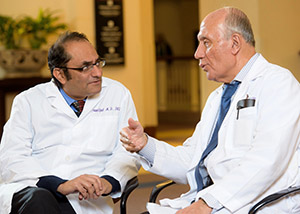Parkinson's Disease
Our Parkinson's Disease care team includes highly experienced professionals in the fields of neurology, psychiatry, nursing, genetics and social work who all work together to establish a treatment plan that addresses the full spectrum of physical, mental and emotional challenges.
Huntington's Disease
Our Huntington’s disease care team includes professionals in neurology, neuropsychiatry, genetic counseling, social work and rehabilitation medicine. Our goal is to help you manage your symptoms and improve your quality of life.
Wilson Disease
Our goal is to detect and treat Wilson disease as early as possible and help improve patients’ quality of life by working to reduce symptoms and prevent complications, and by providing support and assistance to patients and their families. We achieve this through a comprehensive and tailored approach to the management of Wilson disease that addresses the full spectrum of physical, mental and emotional challenges.
Ataxia
We tailor our approach for each patient to address the full spectrum of challenges, including problems with balance, gait, coordination and slurred speech.
Botulinum Toxin
Our movement disorders neurologists provide skilled injection of botulinum toxin for the treatment of a variety of neurological conditions that involve abnormal postures or movements.
Deep Brain Stimulation (DBS)
If you have Parkinson’s disease, dystonia or essential tremor and are no longer able to manage your symptoms with medication, your care team can help you decide if DBS may be the right course of treatment for you.
Dystonia
We offer a comprehensive, individualized treatment approach that addresses the many challenges associated with dystonia, including:
- Involuntary movements
- Uncontrollable blinking
- Contractions and muscle tightness
- Face or voice symptoms
Essential Tremor
Our center offers comprehensive care and management for essential tremor, including specialized skill with botulinum toxin injection and a deep brain stimulation program.
Functional Movement Disorders
We seek to restore function and improve independence for patients who have disabling movement disorders not associated with structural damage to the nervous system. Our approach includes motor reprogramming strategies and pairing rehabilitation with cognitive behavioral techniques.
Genetic Testing and Counseling
We specialize in the diagnosis and treatment of adults and children with rare movement disorders, and movement disorders caused by or linked to gene mutations.
Neuropalliative Care Program
Neuropalliative care provides an added layer of support for patients and families navigating complex neurologic conditions such as Parkinson’s disease. We take a holistic, team-based approach to care, supporting not only physical symptoms but also emotional and spiritual needs.
Progressive Supranuclear Palsy (PSP)
Our movement disorders care team will work with you to help you manage the symptoms of Progressive Supranuclear Palsy and improve your quality of life. We work toward these goals through personalized treatment plans and therapies designed to ease the full range of physical, emotional and mental challenges associated with PSP.
Tic Disorders
We use a multidisciplinary approach with expert neurologists, psychiatrists, nurses, and social workers working collaboratively with patients to plan the best care program to reduce tics.
Tourette Syndrome
Our goal is to help our patients manage Tourette syndrome and improve their quality of life. We do this with a complete and multidisciplinary approach to care. Experts in neurology, social work and psychiatry work with patients to make a treatment plan for their specific needs.
Movement Disorders Cognitive Behavioral Program
Northwestern Medicine provides comprehensive care for patients whose movement disorders cause cognitive, behavioral and emotional symptoms.











